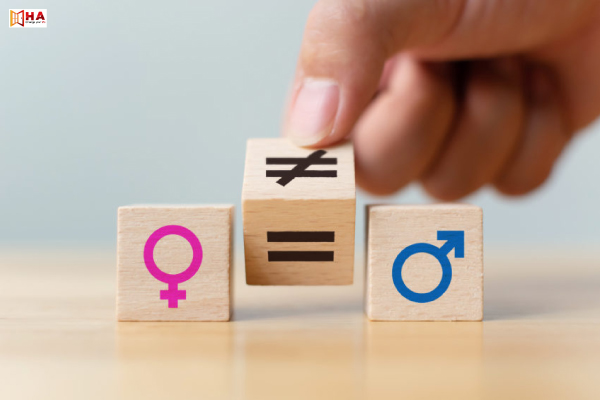Topic về bình đẳng giới không còn là vấn đề xa lạ trong thời buổi hiện tại. Được coi là chủ đề mang tính thời sự, bình đẳng giới thường dễ xuất hiện trong các bài thi IELTS. Với chủ đề Gender equality có độ rộng chúng ta hoàn toàn có thể khai thác và tiếp cận nó từ nhiều góc độ trong phần thi Writing task 2 và Speaking. Nếu bạn nào còn đang băn khoăn không biết nên bắt đầu từ đâu, hãy cùng HA CENTRE tìm hiểu chi tiết topic về gender equality trong bài viết ngày hôm nay nhé!
Bình đẳng giới tiếng Anh là Gender equality (noun), phiên âm là /ˈdʒen.dɚ iˈkwɑː.lə.t̬i/ có nghĩa là được coi trọng như nhau, không phân biệt các đặc điểm giống và khác nhau giữa nam giới và nữ giới.

Topic về gender equality
1/ Một số từ vựng cơ bản chủ đề Gender equality
Nếu bạn làm IELTS Writing, Speaking sẽ không thể thiếu Gender equality vocabulary. Tham khảo một số từ vựng cơ bản về chủ đề bình đẳng giới trong tiếng anh nhé:
- Men and women / Males and Females
- Gender equality = sexual equality: the act of treating women and men equally (bình đẳng giới)
» Gender equality is an issue we have been struggling with in the world for centuries and has yet to be fixed completely.
- Gender inequality: (bất bình đẳng giới)
» The law has done little to prevent gender inequality.
- Gender discrimination = sexism: the act of treating a person, usually a woman, unfairly because of their sex (phân biệt giới tính)
» Gender discrimination accounts for part of the income differences between men and women.
- Women’s rights: the rights of women to be treated equally to men (quyền phụ nữ)
» Today there are international instruments which protect women’s rights.
- Sexual abuse: (lạm dụng tình dục)
- sexual harassment: (quấy rối tình dục)
» Companies should have a zero-tolerance policy on sexual harassment.
2/ Gender in school
- Men and women should have the same educational opportunities.
Đàn ông và phụ nữ cần có cơ hội được học tập như nhau.
» Universities should select candidates according to their academic qualifications.
» Males and females should be accepted onto courses based on their abilities.
» Hard work and individual merit should be used to assess the student’s achievements.
Example: A Japanese medical university acknowledged in 2018 that it has been reducing female applicants’ entrance exam scores for years to keep the numbers of female students low (https://www.japantimes.co.jp).
- It is amiss to discriminate against students because of their gender.
Việc phân biệt đối xử giữa các sinh viên dựa trên giới tính là sai lầm.
» Gender should be irrelevant in education.
» It is imperative that discrimination is banned across entire school communities.

Trường hợp chủ đề gender equality
3/ Gender and work
- Men and women should have access to the same professional opportunities.
Đàn ông và phụ nữ nên được trao những cơ hội nghề nghiệp như nhau.
» Both men and women should be able to pursue a career.
» Employers should assess candidates to employ according to their abilities, qualifications, and experience instead of gender.
» Nowadays, a range of occupations such as lawyers, drivers, doctors, etc. should be available to both sexes. If a male and a female have the equally academic and practical background, he/she could do the jobs as well as the other.
- Women deserve equal pay for equal work.
Phụ nữ xứng đáng được trả công bằng nam giới cho những công việc như nhau.
» Performance in the jobs is based on qualifications and set of skills that an employee has but not on genders.
» Career success must depend on individual merit to the work.
» Men and women should receive equal pay in the workplace.
- Gender pay gap = gender wage gap = Gender wage disparity: the difference between the amounts of money paid to women and men, often for doing the same work (sự chênh lệch tiền lương về giới).
» The government’s aim is to enable women to know whether their employer has a gender pay gap.
4/ Gender in the Family
- Traditional gender roles are gradually changing.
Vai trò truyền thống giữa các giới đang dần thay đổi
» The concept of men as breadwinners and women as homemakers are changing.
» “Househusbands” and “stay-at-home dads” are becoming more common;
» Some women may have better career prospects than their husbands;
» Working women can take maternity leaves during and after pregnancy. After this period, they can continue to work.
- Families can divide roles and responsibilities in the most convenient way.
Gia đình có thể phân chia vai trò và trách nhiệm một cách thuận tiện nhất.
» Parents contribute equally to childcare, cooking, and cleaning.
» Many fathers and mothers share their parenting responsibilities and household chores.
5/ Ý tưởng cho topic về Gender equality
Các đề bài của chủ đề Gender equality chủ yếu xoay quanh vai trò và vị trí của người phụ nữ trong gia đình hoặc ở nơi làm việc. Để làm tốt những bài viết ở topic về Gender equality, bạn phải có những kiến thức nền (background knowledge) và đặc biệt có vốn từ vựng về chủ đề này.
Gender and Education
- Men and women should have access to the same educational opportunities;
- Males and females should be accepted onto courses according to their abilities;
- It is wrong to discriminate against students because of their gender;
- Gender should be irrelevant in education;
- Student’s achievements should depend on hard work and individual merit;
- In the UK, there are similar numbers of male and female students in higher education.
Gender and Work
- Men and women should have access to the same professional opportunities;
- Both man and women should be able to pursue a career;
- They should earn equal salaries;
- They should be employed according to their abilities, qualifications and experience;
- Traditionally women have been restricted to certain roles;
- They were often employed as secretaries or receptionists;
- Nowadays, a range of occupations is available to both sexes;
- Career success depends on individual merit.
Women’s and Men’s Roles in the Family
- Some people argue that a mother should not work;
- She should stay at home and bring up her children;
- The father should be the breadwinner of the family;
- Others believe that both parents should share these responsibilities;
- Working women can take maternity leave during and after pregnancy;
- Many mothers continue to work after this period;
- Many fathers and mothers share their parenting and domestic responsibilities;
- They contribute equally to childcare, cooking, and cleaning;
- Some women may have better career prospects than their husbands;
- Paternity leave and ‘househusbands’ are becoming more common;
- Traditional gender roles are gradually changing;
- Families can divide roles and responsibilities in the most convenient way.
6/ Một số bài viết hay về bình đẳng giới tiếng anh

Một số bài mẫu về bình đẳng giới tiếng anh
Sample 1:
“Universities should accept equal numbers of male and female students in every subject. To what extent do you agree or disagree?”
In my opinion, men and women should have the same educational opportunities. However, I do not agree with the idea of accepting equal proportions of each gender in every university subject.
Having the same number of men and women on all degree courses is simply unrealistic. Student numbers on any course depend on the applications that the institution receives. If a university decided to fill courses with equal numbers of males and females, it would need enough applicants of each gender. In reality, many courses are more popular with one gender than the other, and it would not be practical to aim for equal proportions. For example, nursing courses tend to attract more female applicants, and it would be difficult to fill these courses if fifty percent of the places needed to go to males.
Apart from the practical concerns expressed above, I also believe that it would be unfair to base admission to university courses on gender. Universities should continue to select the best candidates for each course according to their qualifications. In this way, both men and women have the same opportunities, and applicants know that they will be successful if they work hard to achieve good grades at school. If a female student is the best candidate for a place on a course, it is surely wrong to reject her in favor of a male student with lower grades or fewer qualifications.
In conclusion, the selection of university students should be based on merit, and it would be both impractical and unfair to change to a selection procedure based on gender.
Sample 2:
“Many people think that men should go out to work while women’s place is in the home. To what extent do you agree or disagree?”
Women and men have had different roles in the community since the beginning. Although these differences are slowly converging, due to the genetic inheritance and socio-demographic components, they still exist. It is said that men should be the breadwinners while women are more suitable for housework and childcare. In my opinion, this statement is not completely right or wrong and requires careful consideration.
Firstly, it is assumed that men should go out to work. Undoubtedly, men are better adapted genetically to perform physical tasks. The difference in physical abilities is clearly demonstrated in the sporting arena. Take for example the Olympics, or any international sporting event. It can be clearly seen that in these competitions the genders are separated due to inherent differences between the sexes. Similarly, such jobs requiring physical strength as logging or coal mining should continue to be done by men.
Secondly, it has been argued that women are more suitable for their traditional roles in the home. This statement is true to a certain extent but it largely depends on society. In certain traditional societies in Africa, females working is frowned upon and is seen as neglecting the family. Whereas in Afghanistan, in general, females are allowed to do little else but stay at home, being a housewife. Consequently, a woman’s value is largely dictated by society, culture, and history. Nevertheless, to state that her place is in the home is widely considered sexist in modern western societies. Many women nowadays are in positions of power and changing the world to a great extent. For example, Angela Merkel is the Chancellor of Germany and currently ranked as the world’s second most powerful person by Forbes magazine. Her contribution is obviously undeniable
To conclude, differences do exist though these are largely through nature. However, it is a flawed stereotype that women should be at home and the workplace is not for them. This glass ceiling is certainly what should be shattered to assure women of their right to have equal opportunity in life.
Sample 3:
“Some people think women should be allowed to join the army, the navy, and the air force just like men. To what extent do you agree or disagree? Give reasons for your answer.”
Whether women should be allowed to serve in the military has triggered spirited debate. Some assert that women should be allowed to defend their country in the same capacity as their male peers. Personally, I agree with their assertion for two reasons.
History has shown that women are fully capable of performing well in the military. Historically, there were a host of valiant women soldiers whose achievements really put their male counterparts to shame. One need only look at the classic examples of Joan of Arc and Mulan to see how exceptionally women could perform on the battlefield. In my observation, their determination, courage and dignity, to this day, are still being admired by male soldiers and civilians alike throughout the world.
Moreover, from an enlightened standpoint, female patriots should be granted the right to go to the front line when their motherland is involved in a war. Admittedly, gender inequality was a highly controversial issue in the twentieth century. However, now twelve years into the new millennium, women can learn and teach, work and supervise, vote, and vote in most countries just like men. In light of this sweeping progress in gender equality, there is no sense in denying them the right to defend their home country when a war breaks out.
In sum, keeping military services out of the bounds of women in the information age is unwarranted. I have been convinced that it is in the best interest of a nation if women are also granted equal rights in this particular arena.
Việc trang bị cho mình kiến thức bình đẳng giới tiếng Anh là vô cùng quan trọng và cần thiết đối với mọi lứa tuổi. Hãy luôn ghi nhớ “𝑳𝒆𝒂𝒓𝒏𝒊𝒏𝒈 𝒊𝒔 𝒕𝒉𝒆 𝒆𝒚𝒆 𝒐𝒇 𝒕𝒉𝒆 𝒎𝒊𝒏𝒅” – Học tập là đôi mắt của trí tuệ nhé!
Đăng kí học ngay cùng trung tâm HA Centre:
Trên đây là chia sẻ topic về gender equality chi tiết giúp bạn làm tốt phần IELTS Writing task 2, Speaking. Nếu bạn còn thắc mắc hoặc cần được hỗ trợ, hãy liên hệ ngay với HA Centre theo số điện thoại: Mr. Hà: 0963 07 2486 – HOTLINE 1: 032 796 3868 – HOTLINE 2: 032 976 3868 để được tư vấn kỹ hơn nhé!


















